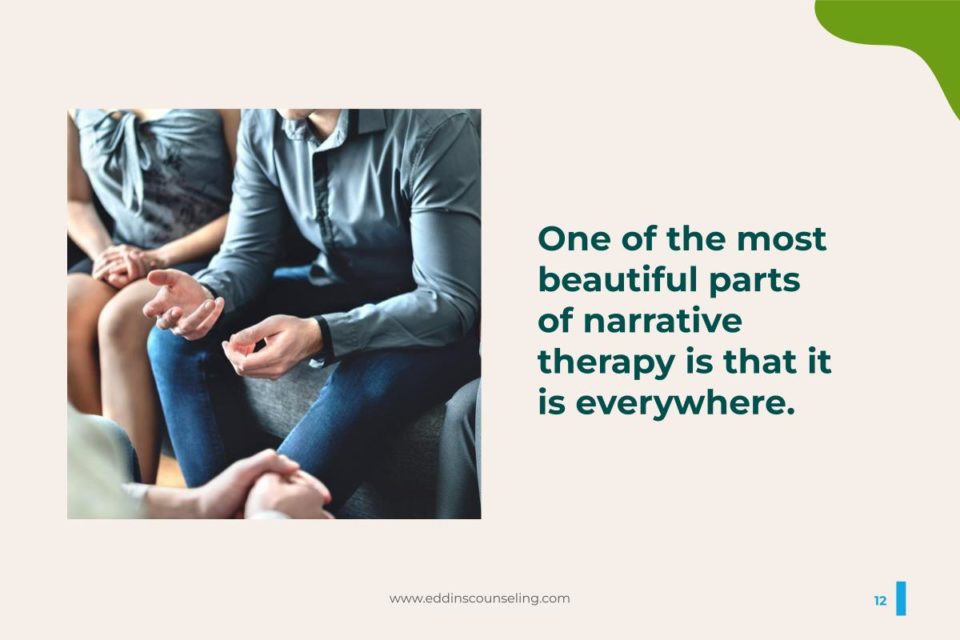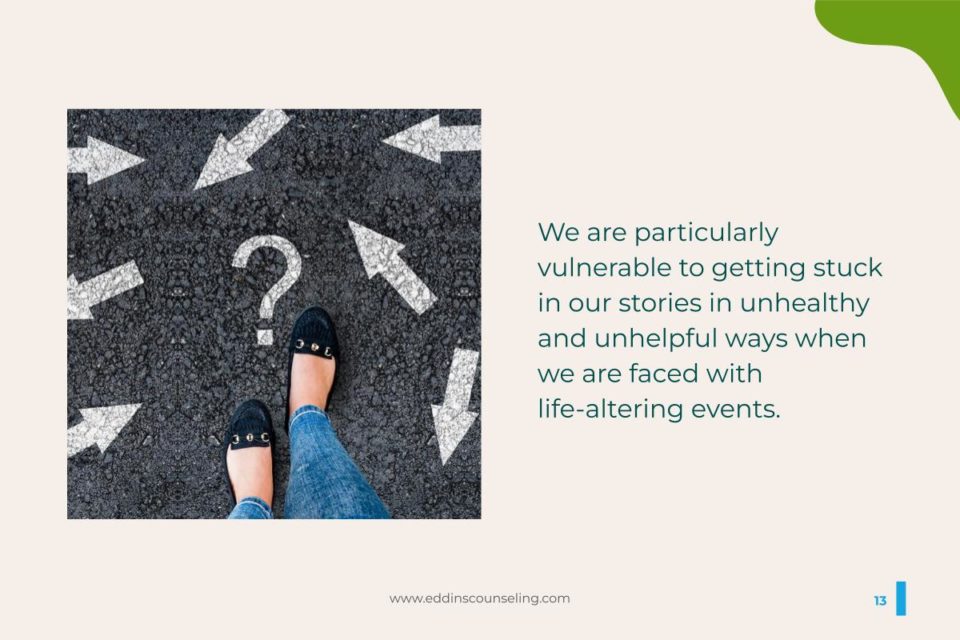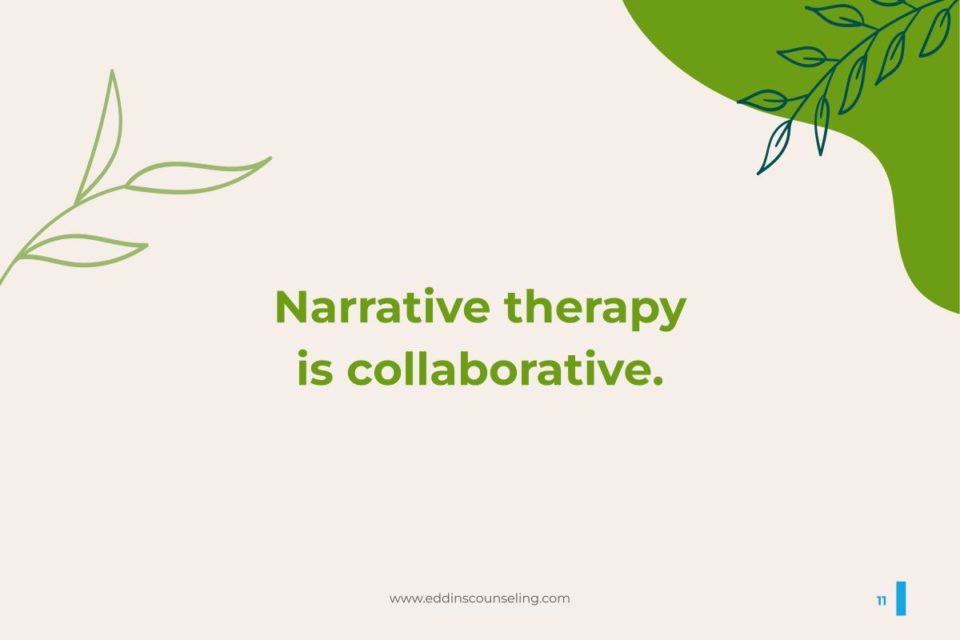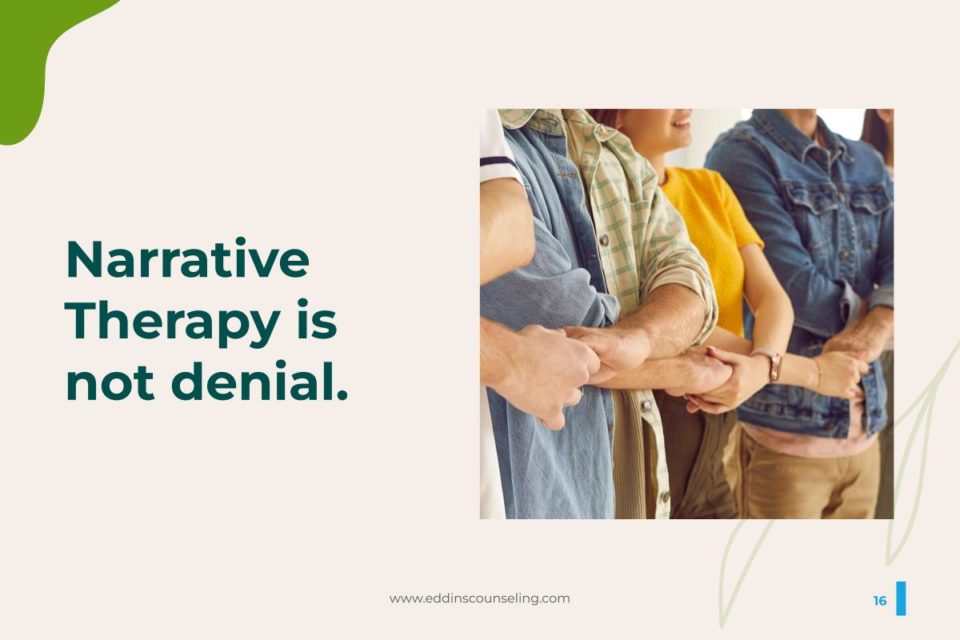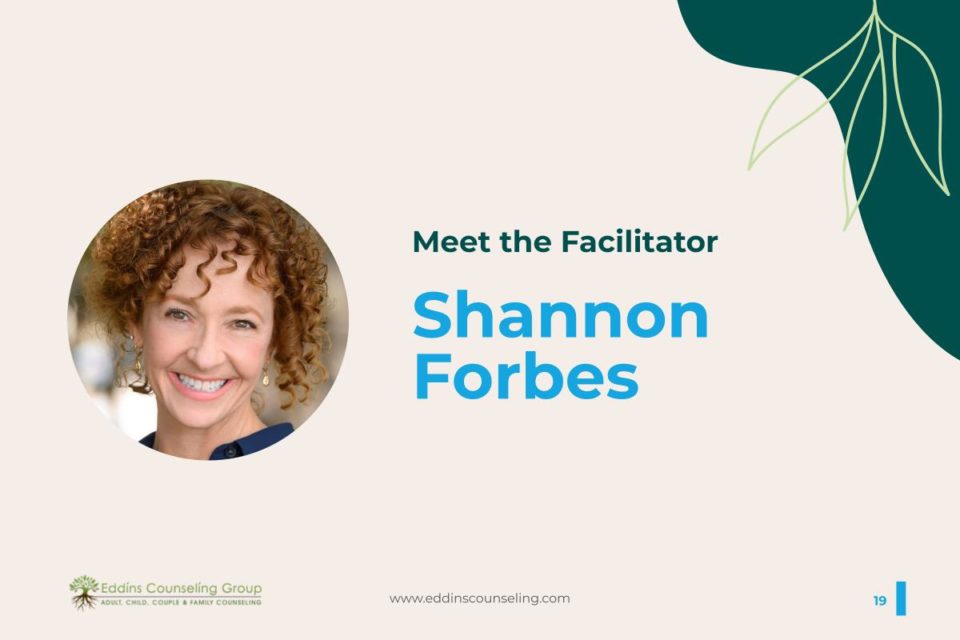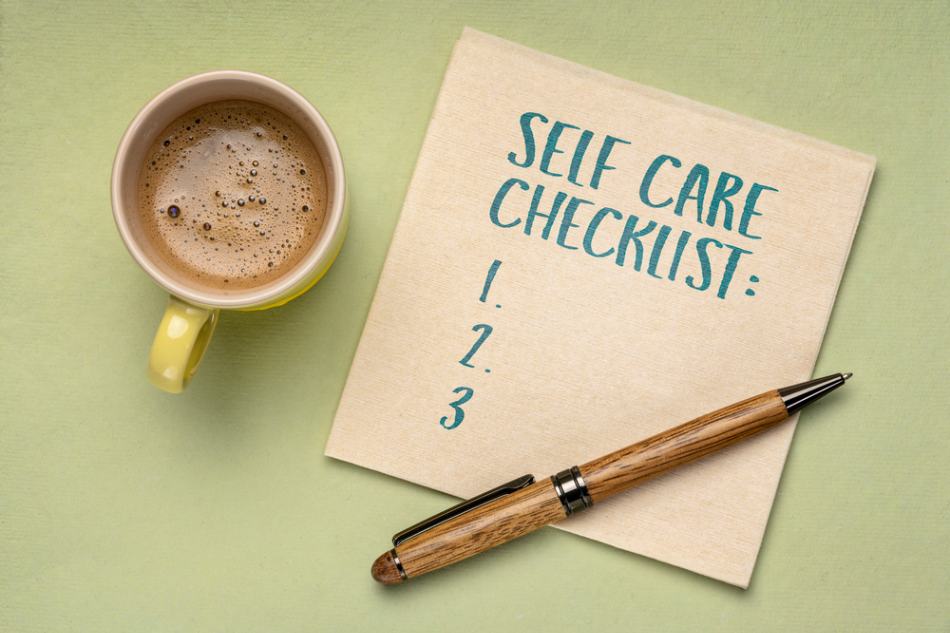October 13, 2022
Webinar: Narrative Therapy and Making Sense of COVID and Other Life-Altering Events
Written by Rachel Eddins
Posted in Emotional & Mental Health, Webinars and with tags: covid-19, types of therapy, wellness

Narrative Therapy offers a helpful tool we can use to make sense not just of how we as individuals have been affected by the COVID-19 Pandemic, but how we might process all life-altering events we encounter.
This webinar is facilitated by Shannon Forbes.
Watch a replay of the presentation here.
Learn more about Narrative therapy.
Here is a transcript of the webinar:
Good evening. My name is Shannon Forbes. This presentation has been a long time in the works. For those of you who are new, I was an English professor for 19 years and studied Narrative Therapy in graduate school.
I have been a student and narrative teacher and have loved it. I have just fallen in love with the importance of narrative over and over again my entire adult life.
When I was in graduate school and through my research, what really stuck with me that I loved about the narrative is the opportunity it gives us to create ourselves.
My research hinged upon this idea that we can create who we are by talking about it.
So it’s not that I’m a bad person and my story is reflecting that. It’s that every single minute that I’m telling a story about myself, I’m able to create what it is that I want to be.
If I want to be courageous, if I want to be kind, or if I want to be authentic, it’s in our power to do that with every story that we tell. And it’s following the story that then we become what it is that we write.
So I love that. And it was great for 25 years. Then a lot of things happened and Covid was a massive major part of that.
I had put in my resignation at work and was ready to take a new path in life that happened in November of 2019 and a lot happened since then. Covid then became for me just this really special counterpart of narrative and sometimes horrific and sometimes painful and always needing to be processed ways. That’s what brings me to you all this evening and I’m delighted to hear your thoughts and to learn from you as well.
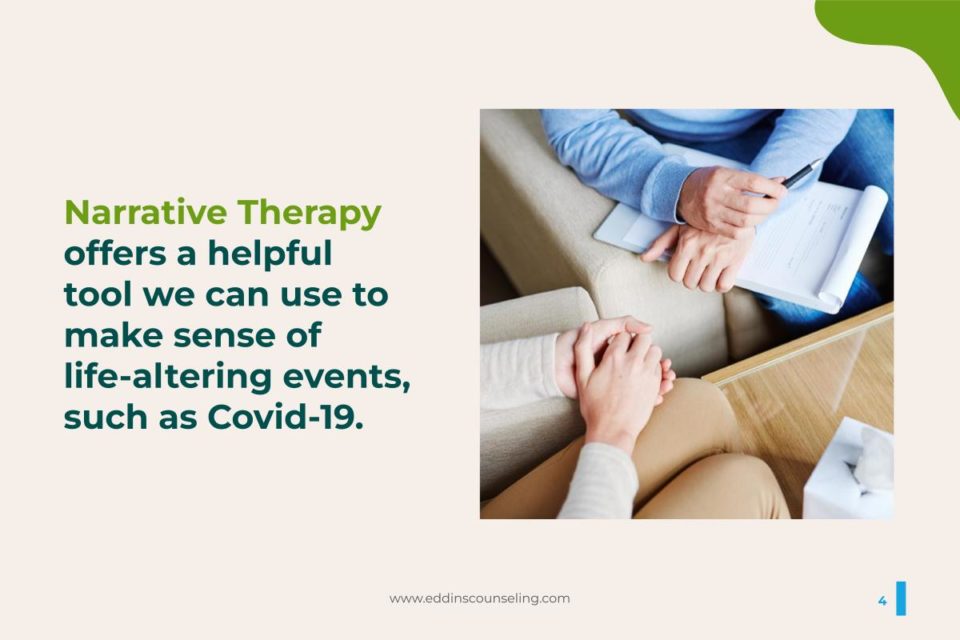
Agenda
The goal for the agenda this evening is that there will be narrative skills that we will be able to develop and work on that applies to so much more than just Covid.
Since changing fields, I became part of the Masters in Counseling program at the Family Institute at Northwestern. That’s where I am doing my work in counseling now as a student.
Eddins Counseling Group has been kind enough to take me on and train me as an intern. I am supervised here by Diana Cabrera-Stewart. If you’ve had any opportunities or a chance to get to know her, she’s fantastic and she watches over me to make sure I can be as helpful as possible to the client here.
Let’s get started.
What is Narrative Therapy?
Let’s start here with a working definition. One of my favorite things about narrative therapy is that it’s a different kind of therapy for each individual client. And that’s beautiful. Isn’t that just spectacular?
When it’s not that we take the theory and apply it to help the client, but rather that we get to collaborate with the client to figure out:
- What is going to be most useful for you?
- How do you use narrative in your life?
- How are you using it in a way that’s serving you?
Well, let’s tap into that. That’s going to be different, client to client, and perhaps how is it not serving you? Again, that’s client to client, isn’t it?
It’s really a collaborative way that we work together and I hope that that’s the spirit that we can come to in this presentation as well.
We tell ourselves and we tell other people’s stories every day. Think about it like the people watching. That is so common in airports or wherever. It’s a fun question I used to ask my students and they loved it:
“Is there ever a moment in the day, ever, when we are not narrating?”
And somebody would always like, raise their hand and they’d be: “When we’re sleeping. We’re not narrating when we’re sleeping. And I say: “Your brain is totally narrating when you are sleeping. That’s a huge part of it as well.”
Sometimes the way we tell these stories can really enhance our lives. But sometimes the way we shape these stories really impairs our health, too.
That’s the goal of narrative therapy, which is to maximize how we tell these stories because we’re going to be narrating one way or another. It’s almost impossible to turn off.
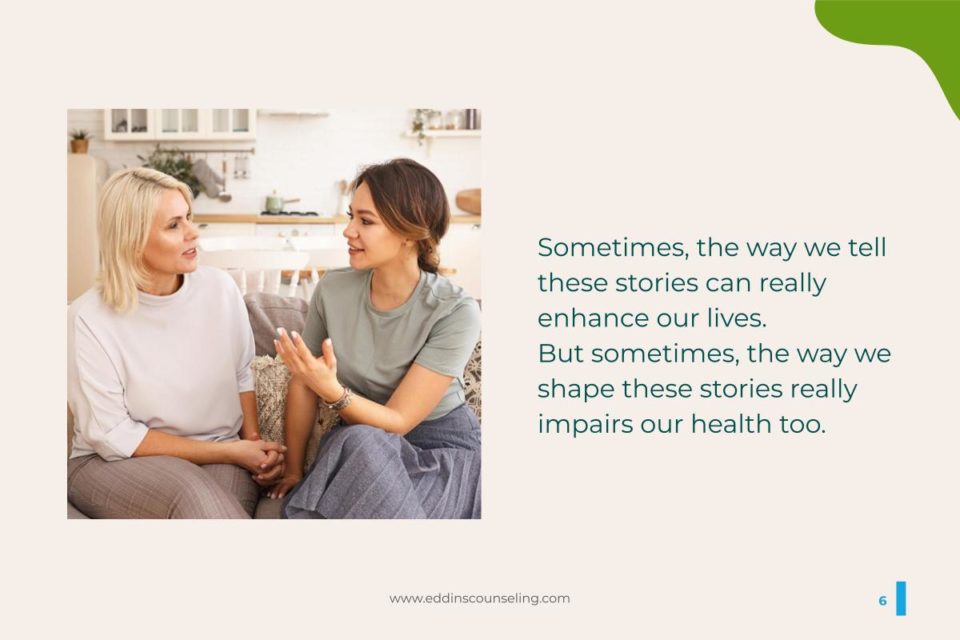
Using Narrative Therapy to Enhance Our Lives
Other people, of course, a huge part of our lives. A lot of times other people are telling us our stories. Think about that. Sometimes we don’t even realize it. That’s a big piece, isn’t it?
We really want to surround ourselves with the people who are helping us to tell our stories in a way that is helpful to us and not harmful.
Together, clients and therapists, this is what we try to do. We try to find alternative angles to view our problems, healing techniques, new solutions, and new interpretations.
New ways of looking at the way we’re telling our stories, and it’s pretty cool because at first, what we’re doing here is something that we have to very consciously be doing.
That’s part of what the goal of the therapy is. To get the clients to be able to catch themselves. Like: “Oh, okay, I saw what I was doing there. Let me do a reframe on it.”
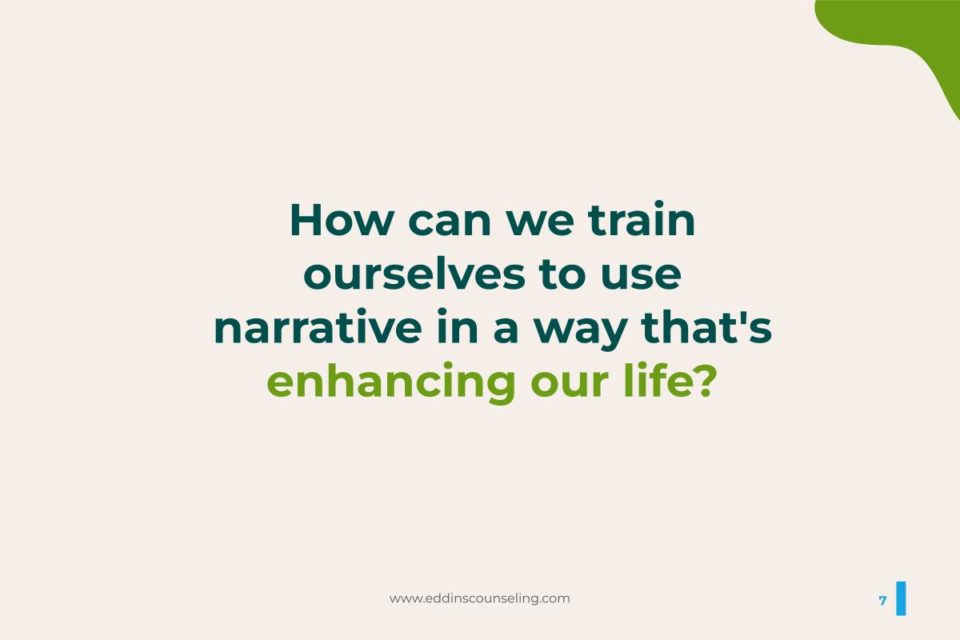
But eventually, with practice, it’s really cool. We start to actually just think like this. I mean, it’s hard-won, and there’s a lot of practice to it, but it does happen that we can train ourselves how to narrate what’s going on in our lives.
Other people telling me my story mixed with my low self-esteem has been a huge hindrance. In so many different ways. And it’s frustrating, isn’t it?
And there are ways that we can train ourselves to make sure that that’s happening. Everybody wants to tell everybody else’s story. Especially when they’re fielding it through their own defense mechanism. Social media is a huge piece of that.
Here’s our working definition. We work and we work, and we work, and we build it, and we build it, and we build it, and it becomes different for each client. Each client is very special. Each one of us has a different way of narrative functions and the way we want narratives to function in our life.
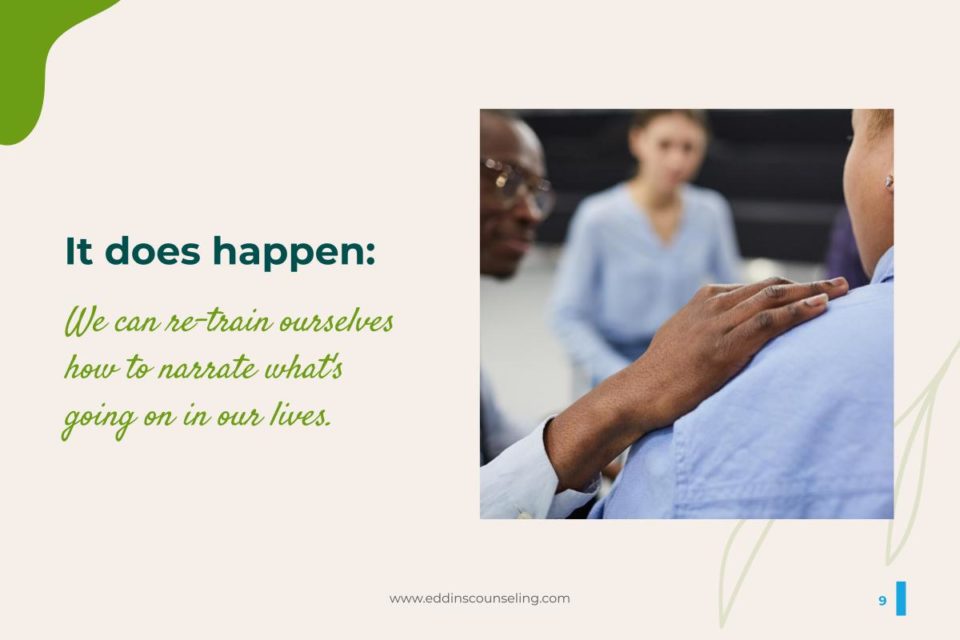
Tailored & Individual: Is Narrative Therapy for You?
Narrative therapy is collaborative. It’s a sacred relationship that you have with the way you present yourself, and the way you want to present your stories to you. It is also a joyful, and sometimes painful experience shared between clients and therapists. The narrative is hard, isn’t it? Especially when we’re talking about life-altering events.
Part of our work is to create an awareness of what narrative is for you, how you use narrative in your life, and what functions stories serve or do not serve for you.
Part of our work in therapy is to spend a good amount of time handling what you’re finding and the way you’re hearing others tell your stories and the way you’re telling your own.
And I was just thinking about you all. I was just flipping through magazines, and I don’t know if you can see this on screen, but I was so delighted. You start to notice it everywhere once you’re conscious of it.
Rewriting the Client’s Narrative Through Colors
This just gives you an example of an almost infinite number of ways that we can go in session and try to get our in to figure out what the best way is to understand narrative in your life.
This article says that it can often be helpful to begin by asking a client:
What color or colors do you feel reflect your personality?
As I was reading that and thinking about this presentation, I was wondering: “What colors would I associate with Covid?” If you can identify what that color might be, it really does give you a clue as to how to start thinking about this event.
Yes, this writer writes, and the answers to this seemingly simple question can be rather complex. The numerous color mixtures, and hues that we see and the myriad ways in which we view colors invoke meaning in our lives. So that’s the creativity that we get to explore.
How it is that you wish to approach a study of narrative therapy? It’s a very empowering therapy. It’s yours, and I’m here just to help you find it.
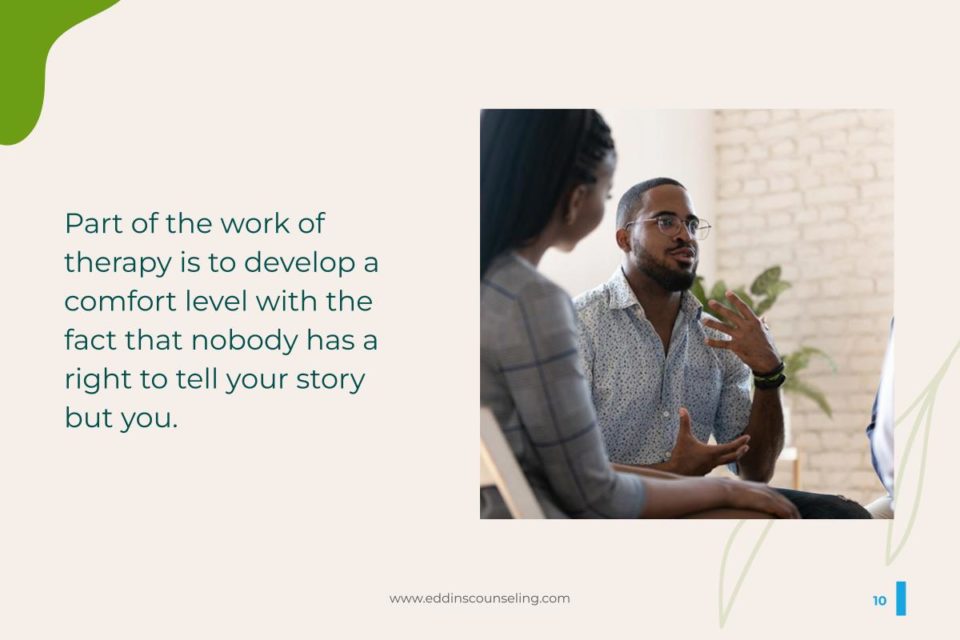
Other Examples of How We Use Narrative
There was a word in Old English that interestingly has gotten phased out by now. The word is Tarah, and it’s an old English word. It’s a special word to describe specifically the grief and sadness that we experience in the hour before dawn. Can you believe that it was that common?
If you are somebody who just gets exactly what I’m talking about, know that you are in good company. There’s no real point in even trying to fall asleep again. We can’t. We try. And so we just lie there for an hour before dawn when the stories start. It is so common that an entire word was dedicated to that specific grief and sadness that we experience in the hour before dawn.
I do find it interesting that the word has been phased out by now. In my experience with clients and people in general, that hour is still very much true. I’m wondering if you are all living in the Old English world with me at this moment.
Art is Another Form of Narrative
If you like to sketch, paint, draw, or decorate your house. I am so specific about furniture arrangements in my house. To me, that is a form of narrative. How I come in and how others come into my home and the way things are spaced. I mean, what’s emphasized? Is it the TV, the hearth, the kitchen, the table, or the bedroom?
Narrative can be in the way we arrange our houses. It can be in a magazine article that you just happen to see. It can be in a conversation that you’re having with a good friend or not a very good friend. It can be in art, it can be in the morning, it can be at night. It can be the way you choose your clothes, the way you fix your hair, and the way you walk. It’s everywhere.
Here’s a Problem with Narrative
We are particularly vulnerable to getting stuck in our stories in unhealthy and unhelpful ways when we are faced with life-altering events.
That’s when we’re vulnerable. That’s when narrative can feel like it’s attacking us because there’s so much fear there that comes with life-altering events.
During these times of confusion, doubt, fear, and questioning, narrative therapy can be so very, very useful. It can be an anchor during these times that we can hold on to, that can ground us. It can work against us, or it can work for us.
Part of training yourself with the theories is to figure out how to make it work for you and not against you.
In my first vocation, one of the moments I’ll never forget that really hooked me into the power of narrative and the way it serves in our lives is this one: I was reading this article from this anthropologist who was talking about how anthropologically, we are wired to create order, we need to have order. The chaos around us is very unsettling. It’s very, very, very disturbing to our mental health.
Creating Order from Disorder
Narrative is one of the most anthropologically common ways that people create order from disorder. And we’re always trying in mental health to move to a place of order. We need an auditor.
So here’s where it can get really, really messy. If we have people in our lives who are not helping us in this goal to create order, then they worsen the doubt, they worsen the fear. They feed into the confusion. They make us doubt ourselves more. So we have to be very careful about the company that we’re keeping. Sometimes that can be a difficult part of narrative therapy.
We realized that there are people in our lives who help us and aid us in our mental health quest and those who have their own narrative agenda.
As your therapist, the goal of narrative therapy is to help you tap into the strength that you already have. So it’s a very positive theory.
There are a lot of different ways that you are surviving and thriving brilliantly in the face of impossible situations.
There are so many ways that you’re not aware of it. There are so many things that you’re doing that are miraculously influential, but we’re not aware that we’re doing them.
We try to figure out, what are those things that you’re doing that’s working? And we try to tap into that and really understand the feelings and the thoughts and the emotions that are connected with what’s working, what you’re already doing. And in doing so, we can find new ways of interpreting events that have dramatically, often unexpectedly, and sometimes devastatingly altered the course of our life.
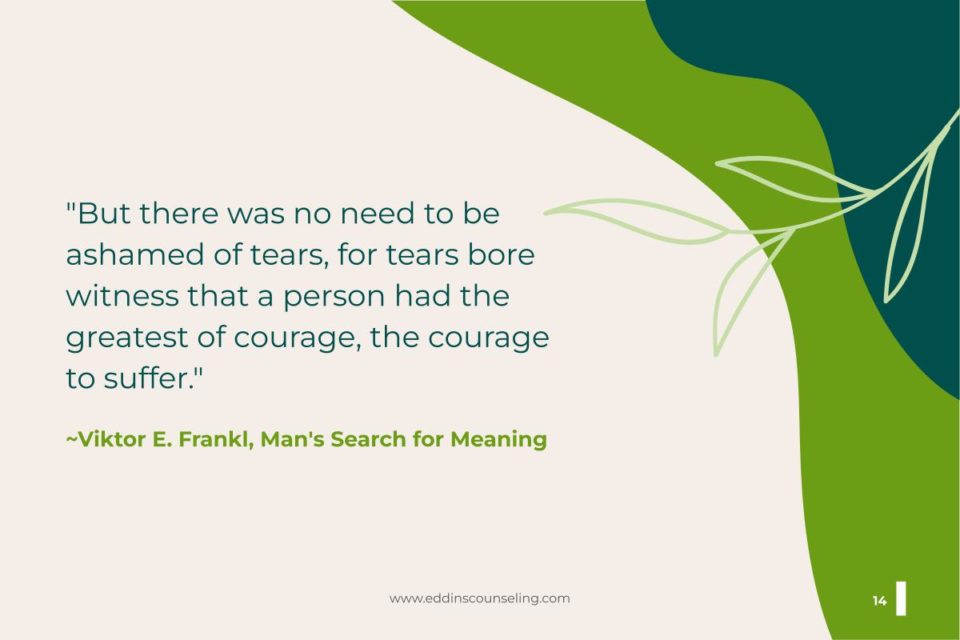
Viktor Frankl’s Connection to Narrative Therapy
One of my favorite quotes is by Viktor E. Frankl, Man’s Search for Meaning:
In many ways, as I look back upon it, in all of my studies, I would say he was one of the pioneers of narrative therapy before narrative therapy had a name.
Victor Frankel was a survivor of the Holocaust. He’s a very interesting survivor of the Holocaust because he happened to be not just a neurologist, he was an MD, and he also had a PhD and studied philosophy and psychology.
That’s a really amazing connection to be able to have that training in medical parts and then also that training in the philosophic part, and also to be a fantastic writer.
He was in four different concentration camps. He lost his mother, father, brother, and his wife. He was in Auschwitz.
And he also, upon being taken, was in the process of writing a new manuscript. This was supposed to be his life-changing moment of publication, and they confiscated his manuscripts. This was a particularly big deal back then because there was no other copy, didn’t save files back then in the same way that one electronically can do now.
So, he decided as he was in the concentration camp: “Okay, I’ve just lost the work that was supposed to be my life’s work. I got to start all over again. What am I going to do?” So he thought to himself:
“This is a life-altering event of epic proportion. This is the hub of human suffering where I am right now. What can I observe while I’m here, in this unique situation where I am observing the worst of human nature?”
What he came out of, and this ended up being his book, is that the one thing that can get us through any life-altering event, the one thing that we all seek, that can change and save anyone, is if we can find meaning.
How We Find Meaning
Narrative is how we find meaning. Language shapes our reality, and so we figure out how to tap into our imagination in a way that can be useful.
What do you see Frankl doing in this quote? This is narrative therapy in a life-altering event right here. This is what we aim for.
I see this all the time with clients.
- Clients will be emotional in sessions. They’ll be crying in session.
- And interestingly apologizing for that: “I’m sorry, I’m just unusually not this dramatic. I’m sorry. I shouldn’t be crying right now.”
- That’s narrative telling us that we shouldn’t be feeling this. We shouldn’t be crying. We shouldn’t be experiencing this moment.
Frankl reframes this, and in his mind, the story does not become shame. Absolutely not. That’s courage.
Suffering is so hard, and to have the courage to suffer, your tears are proof of that.
So that’s an example of narrative used in a life-altering event in a way where the goal is to not make the problem go away, but rather to reframe it in a way that’s tapping into the strength. So what became shame becomes courage in the way we shape the language.
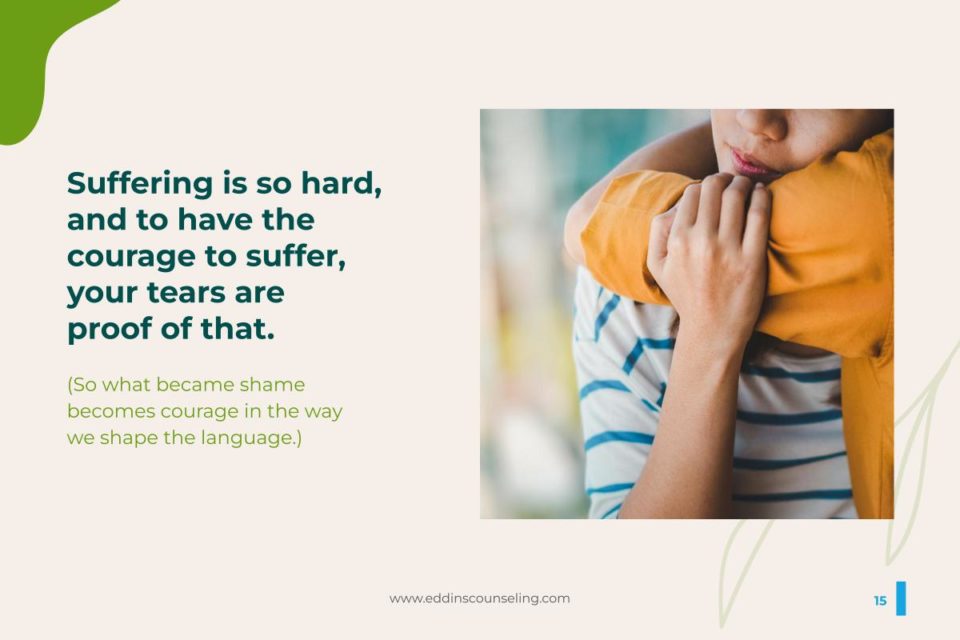
What Narrative Therapy is Not?
It is not denial.
We do not say: “You know what? It’s not a big deal. You know what? You’ll be fine. Just get over it. A lot worse things have happened. Your situation turned out okay.”
There are a lot of maladaptive coping mechanisms that we sometimes can call forth when we’re in moments of suffering. They’re not the best versions of ourselves. And this is why it’s so good to have somebody who can catch you when you’re doing that. We don’t deny, we don’t rationalize bad behavior.
I see my children doing this all the time. They say: “Mom, everybody makes mistakes. You’re so hard on us. Everybody makes mistakes.” That’s not a self-soothing technique this particular moment that I’m going to allow you to adopt. You need to take responsibility here for what you did. That’s the story. Not the story that you’re letting yourself off the hook.
Have you been in that situation where you’ve heard somebody start to say: “I’m seeing you don’t smile.” Where you’re hearing somebody say: “No, no, that wasn’t nice what you did. You can’t explain it away.”
So it’s not denial, it’s not rationalization.
It is not maladaptive coping mechanisms or toxic positivity.
Have you heard of the phrase, toxic positivity? I was thinking about this presentation. We were hosting some friends for dinner, and about ten minutes before, I bought this massive glass jar of vanilla extract, and I dropped it on my kitchen floor and the brown liquid went everywhere along with shattered glass. If somebody had walked in and said: “You know what? Don’t cry over spilled milk.” I would have not responded in a very counselor-like matter.
It is not disregarding actual problems as non-problems.
We don’t use narrative therapy to tell us that things are not problems if they’re actual problems.
We need to feel our emotions. At that moment, I was very frustrated, and if somebody walked in and said to me: “Don’t be frustrated”, that would be kind of hijacking my narrative. My narrative at that moment is: “I’m very, very, very frustrated”.
In a life-altering event, this can be really devastating. Sometimes we’ll hear people say at funerals: “He’s in a better place now.” That might make the person feel better if that’s part of the narrative that works for them.
It also might be something that we’re wanting to do to make the moment feel a little bit more comfortable when really that person is suffering tremendously and wants to feel that somebody understands how much the suffering is impacting them.
Viktor Frankl’s Reflections
An abnormal reaction to an abnormal situation is normal behavior.
What Frankl was doing in this quote (in this moment), in his particular life-altering experience, is that he was trying to figure out how he was going to move forward and live in a world where people were doing these horrific, unimaginable things to each other. It can be paralyzing to see something so awful that another human is doing to a person. And so he’s studying and he’s studying and studying.
Narrative Therapy is Slow
This is something that we have to kind of grow into.
It’s not like you just wake up and tell yourself something because you have to believe it. It can’t be just the words, but you start with the words and the belief then follows. So this is how he reframed: “I am seeing unimaginable things. I don’t know how to process it. And this is the narrative that he comes up with.”
In abnormal life-altering events, abnormal behavior makes sense. That’s normal. I don’t accept it. I don’t think it’s okay. I’m suffering and the world is suffering. But here is how I am going to personally tell myself this so that I can function and move on.
Covid and Other Life-Altering Events
What can other life-altering events be? Divorce, death of family members, loss of jobs, pandemics, etc. They’re very personal and unique to the individual. So they’re the story of us all, but they’re also very personal. They’re very much our experience.
There is a huge item of research in counseling and psychotherapy right now, and I could just toss all of this research at you, but that’s not what I’m interested in.
I’m interested in what your experience was with Covid? What did it do to you?
- Was it mostly a job, or economic situation?
- Is it the way you’re living right now?
- Or is it the psychological toll of the fear, of the isolation?
- Is it the uncertainty of not knowing what’s next?
- Is it the loss of time that you are cheated out of with loved ones?
- Equally disorienting is it sometimes some good stuff and you’re trying to reconcile that?
I have friends whose children took their lives, friends whose spouses died, and friends who lost jobs. I was in the middle of a career change. I was absolutely terrified. I felt so alone in making that career shift. And then suddenly I had my three daughters in the house with me every single day.
So that’s the disorientation that we also try to find resolution with through narrative. How can something so bad, confusingly, also have parts to it that we struggle with language, almost feel at times like blessings?
So what is your experience with your time now, during, or in the future? I’d love to finish up now by giving you some sort of beginning that you can use if you wish to take this forward.
Covid Within Context, Yes? (Or…?)
“The world has entered un-chartered waters that only time and history will make sense of. War conflicts have been the closest parallels of global or regional turmoil. Even such periods of destruction and loss can be predicted to a certain extent, as causes are overt, gradual, and externalized. The COVID-19 crisis took world leaders, economic markets, healthcare systems, and societies by surprise in its rapid escalation and impact on every single aspect of life. Its aftermath is speculative and obscure. We face sudden changes in lifestyle, self-isolation that transgresses socioeconomic strata, fears of health and economic contagion, uncertainty on the duration and outcome of the crisis, and visible collapse of economic industries that go beyond individual job losses (World Health Organization, 2020a). Social media serve both our interconnectedness with family, friends, and colleagues and a less welcome 24-hr reinforcement of our anxieties. Crucially, no one is immune.”
Content source: Vostanis, Panos & Chance A. Bell. (2020). Counseling & Psychotherapy Research, 20(3), 389-93.

Your Experience, Your Story
Maybe you feel like jotting some stuff down and beginning this work for yourself. Where do we want to start? Where I like to start? As with all forms of therapy, what is your goal?
Let’s pretend that you got exactly what you wanted out of the use of this therapy. What would that look like?
See if you can put that in goal form. I want to accept my anxiety rather than eliminate it. That might be a goal. I want to improve my self-esteem. I don’t like who I am right now and I want to like who I am.
Or, I want to get rid of the fear that could be a goal. I want to have a more positive way of looking at the world. I’m tired of being so cynical. These are just examples.
Everything is as unique as you are. But if you can shape it into a goal, then as you’re learning and you’re training yourself how to use narrative, then it naturally starts to come. You’re working toward this goal.
That’s the first thing that I like to do.
What Do You Want? What is Your Goal?
- Do you want to find acceptance?
- Do you want to find peace?
- Or do you want to understand so that you can find closure and move on?
It’s helpful at this point. Once you have your goal, I like to kind of scale it.
So let’s pretend that a 10 is: you’ve achieved the goal, it happened. And 1 – this is not acceptable. I don’t feel good about the way things are going right now. It’s ghastly, awful, almost unbearable.
Where are you on that scale from 1 to 10?
Because the important thing with narrative therapy is we have to remember that we make small changes. We can’t just move to closure, move from 1 to 10 with just one story.
I think that’s kind of the attempt sometimes, like the example that I used with funerals. That’s an attempt to move from one to ten too quickly. That’s why it doesn’t work.
If you’re at a 4 right now with your goal, what can we do with your narrative to get you to a 5? And then once you get to a 5, maybe you’re content being at a 5. Maybe you want to hang out there for awhile. Or maybe then we talk about how do we get from a 5 to 6?
What is the Goal of the Narrative?
So we come up with a goal for the narrative. What is the goal of the narrative you will create surrounding this life event?
We scale it, and then we find the parts that you’re doing in narrating your life that is already working.
The places in your story that you like. What’s working for you in the narrative?
Identify a good moment
Sometimes it can be helpful in these moments to identify moments. Take the pandemic, for example. I remember Christmas was really great because it was just me and one other person, and I finally got to cook exactly what I wanted without worrying about anybody else.
That would be a place to start. Start with the moments where you’re like: “Yeah, I can narrate that in a way that is pleasing to me, in a way that helps me move toward my goal”.
Identify a not-so-good moment
Then find another one. I really wasn’t happy in that job anyway, and I never would have left it. It took three years of hell for me to get to where I am right now. But I actually like the job that I have now better. I’d still be in that old job if Covid hadn’t happened.
Now, remember, we’re not denying, we’re not saying, therefore, Covid was good. That’s not the narrative. But we look for these moments of your strength.
Working Towards Your Goal
So if your goal is peace, look for the moments where you’re feeling that you’re narrating towards peace, the memories that you have of Covid, or where you are today in your thinking of Covid. If your goal is acceptance, if your goal is to find closure.
It’s a long process, but this is what we do. So we build and build and build more and more of these moments that we locate where you are pleased with yourself for the way you’re remembering that day, that event, or that experience in that five-minute window of time. It’s called amplification.
The more and more and more we build, the more ground the story becomes as a way to move towards your goal.
And eventually, you surpass the goal because it’s not just a narrative that you have achieved that goal of what you want from that life-altering event. It’s a way of thinking that prepares you for future life-altering events that maybe you won’t experience, but that you’ll be able to help others through, too.

My Conclusion… Your Beginning
While our goals are tailored and as beautifully individual as is each client, ultimately, what we work toward through Narrative Therapy, is the construction of new meaning and a satisfactory, more fulfilling reframe in the hope not just of celebrating your strengths, and of optimizing human functioning, but also, to aim so, so high – to find peace, acceptance, and again, though sometimes it initially feels impossible, joy and love for the fullness of our human experience.
Thanks for Joining Me!
So I leave you with my thanks. I appreciate your patience. And one more reminder before you leave. If you could fill out the feedback form, we would be grateful for that too. Thank you.
And also, there’s so much research on this and there are so many different ways to go. I have my email on the last slide. It’s also on Eddins Counseling’s website. And if you would like any references or if I can answer any questions or if there’s any further research that you would like to know about absolutely. We always love to hear from you.
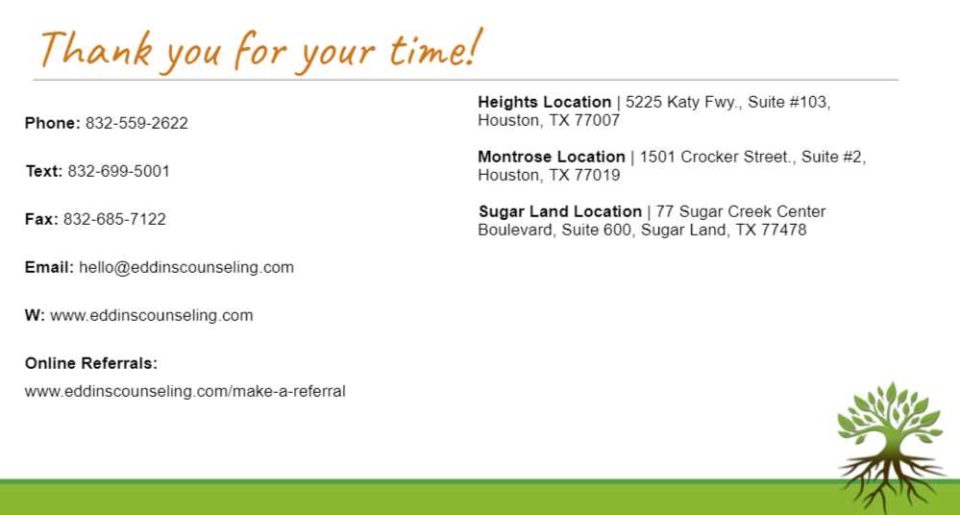
Questions? E-mail Facilitator Shannon Forbes
If you have any questions or would like to email me, my email address is [email protected].
This is our information at Eddins Counseling. We hope you get started with one of our Houston, Montrose, or Sugar Land therapists today.
Alright, well, that concludes our time. Thank you again and I wish you well in your work with narrative therapy.
Grounding & Self Soothing
Get instant access to your free ebook.
Why You Feel This Way
Get instant access to your free ebook.


